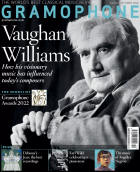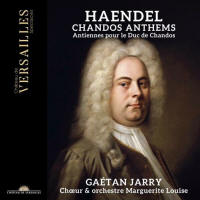Texte paru dans: / Appeared in: |
|
|
Outil de traduction |
|
|
Over a dinner last month, I was discussing with a friend what the French mean by inégal. ‘It’s not a case of just rhythm’, she said. Rather, French period bands look for inequality everywhere: in the music’s structure, colour, phrasing, intonation. ‘It’s the invisible in the music’, she told me with a flick of her cigarette. This release of Handel’s Chandos Anthems (spelt here as ‘Haendel’, as if to emphasise what Laurent Brunner calls the composer’s ‘remarkable synthesis of the musical traditions of Germany, Italy, France and England’ in his lively booklet note) is a good example of this. Inégal is everywhere, and its looseness is luxurious. Take the third movement of the first anthem, O be joyful in the Lord, HWV246, the singer’s entrance after the instrumental Adagio and Allegro movements. Tenor Nicholas Scott is gloriously limber, and then, in counterpoint with oboist Neven Lesage, wrapped in a cycle of fifths, it’s like two lovers in improvisational sway. The basso continuo, with the faintest buzz of bassoon, neatly chomps away beneath, and then the chorus emerge as incorporeal radiance (a tactic replicated in the fourth anthem). It’s truly delightful music-making, and conductor Gaétan Jarry does an excellent job in balancing all these different elements. A few movements later, Lesage turns up again in an exquisite duet with violinist Emmanuel Resche-Caserta. There is such character in their exchange – timidity and a slight awkwardness, as if the pair are on a first date: it’s charming and far more colourful than the interpretation by Harry Christophers and The Sixteen. I adore the (spurious) Voluntary III in A minor, particularly its Allegro and fugue, which provides some respite from the choral profusion. Jarry plays on the organ of the Royal Chapel in Versailles. This reimagining of Handel’s Anglican chamber-scale anthems for a much more spacious acoustic really works, and producer and engineer Florent Ollivier spectacularly captures this sound and atmosphere. Only occasionally, however, does looseness spill over. I require more structure, for example, in the fifth movement of the fourth anthem, O sing unto the Lord a new song, HWV249b. Of course, this is supposed to depict ‘the waves of the sea raging horribly’. But a more solid sense of collective pulse would, paradoxically, help create more liquid swoosh and swell. A similar story for the choral fugue of As pants the hart for cooling streams: it’s too foggy, and a more defined tactus would indeed heighten the spiritual thirst (a notch or two faster would go a long way, too). The orchestra in the recitative section in ‘Now, when I think thereupon’ is almost comically unresponsive, yet when prefaced by the spidery filigree of Resche-Caserta and Scott’s plangent outpour, it’s silly to complain. Glorious sonorities and colours, then, but Handel requires a tighter touch.
|
|




